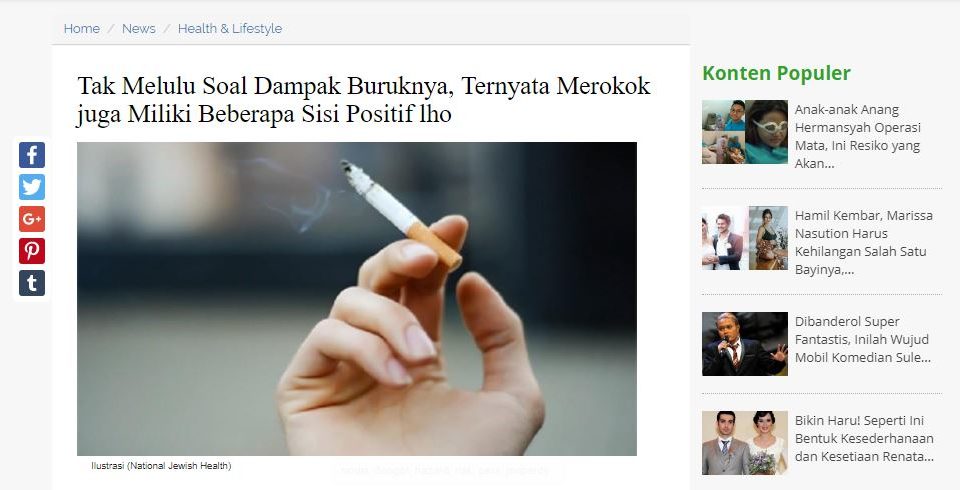Indonesia has the unfortunate distinction of having one of the highest smoking rates in the world, especially among men and underage children and an estimated rate of over 200,000 deaths per year due to tobacco-related diseases. And it’s still rising. This is due in large part to a lack of government regulations on smoking advertisements – most Indonesians are bombarded with tobacco ads from every angle, even (especially) children around schools.
If you think things might any different online, check out this article that was shared through the Facebook page of Tribunnews.com, which has 8.5 million followers and belongs to one one of the biggest online media outlets in Indonesia (Tribunnews.com is the #8th most visited website within Indonesia according to Similarweb).
https://www.facebook.com/tribunnews/posts/10156171149194962
The headline translates to: “Not Just Bad Effects, It Turns Out Smoking Also Has Some Positive Sides”
Now when you visit the link you’ll notice it takes you to the website blog.tribunjualbeli.com, not tribunnews.com. While that site is filled with articles, many of them conspicuously advertorial in nature, the name suggests it is not a real news site but a blog and so perhaps it could be argued that it shouldn’t be held to the same standards as a news site like Tribunnews.com .
Except, of course, that it was shared via Tribunnews.com’s official Facebook page (the one with 8.5 million followers). And it is included in the news / health content category.
At any rate, what does the article argue are the positive effects of smoking? Although it doesn’t link to any sources, it says smoking lowers the risk of knee joint surgery (one reason – smokers are less likely to run), Parkinson’s disease, obesity, the risk of death after a heart attack, and improves the effectiveness of the heart medicine clopidogrel. Some but not all of those points cite studies that prove them (again with no links but they do seem to have cited real studies).
While some of the article’s specifics may be true, it never makes the point of saying that overall the negative health impacts of smoking far, far, far outweigh any potential benefits. Read with an uncritical eye, there is no doubt an article like this could only make a reader think smoking is less dangerous than it actually is.
Is it unethical? Well, if you consider publishing and promoting information that is dangerous to the public (like posting bomb-making instructions) unethical, then yes.
Media companies in Indonesia can and do get into trouble for ethical breaches, but the chance that anybody else will call Tribun on this are small. After all, they don’t have the most sterling reputation for journalism anyways and they’ve insulated themselves by posting it to a sister “blog” site (as some other media outlets here do too, generally to publish articles that adhere to few, if any, journalistic standards).
And, on top of that, arguing the benefits of smoking is seen as legitimate discourse in Indonesia still. Politicians have long used arguments about tobacco’s supposed medicinal qualities, in tandem with arguments about how regulations will hurt poor tobacco farmers, to reject even moderate regulations on the lucrative industry.
Western countries like the United States struggled for decades to dismantle the power of their tobacco industries, who also used phony arguments about the health benefits of their products to stave off regulations. But those arguments, and the many multi-million dollar lawsuits they set off, have been settled.
https://www.youtube.com/watch?v=D-y_N4u0uRQ
That’s why the international tobacco industry is exploiting countries like Indonesia. Because arguments like this are still tolerated. But there’s no debate, promoting smoking is unquestionably dangerous to people’s health and it shouldn’t be tolerated by either the media or the government.




